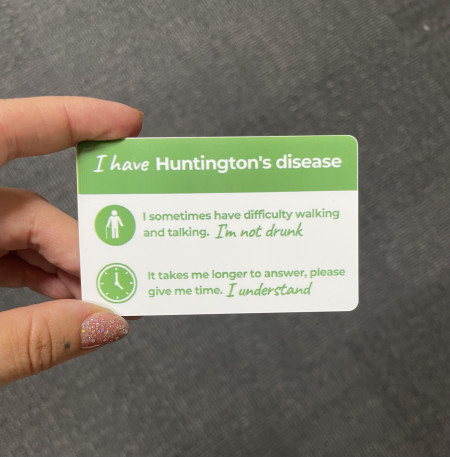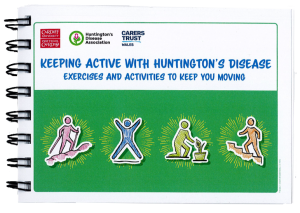Behind the gene - Maureen's story
Awareness, Campaigning, Community stories
Helpline:
If you are helping someone with Huntington’s to manage daily life, you may gradually be taking on the role of ‘carer’. Many people who look after a member of their family or a partner don’t see themselves as a carer because first and foremost they are a son, daughter, partner or parent to the person with Huntington’s. As the disease progresses, however, the person with Huntington’s will need increasing amounts of support and the caring role increases.
In addition, because of the genetic nature of the disease, some Huntington’s carers may have cared for others in their family, or may be at risk of the disease themselves.
How you feel about your caring role will vary greatly depending on your individual circumstances, but all carers are likely to find that there are times when they struggle practically and emotionally.
Living with Huntington’s disease can be very difficult, for you as a carer, as well as for those who have it. The right support can make a big difference and we’re here to help. Many carers have found it can help them to feel less isolated, and to get advice and support, by connecting with others in a similar situation, either in person or online.

Our advisers can help you navigate your role as a carer.

Our message board is a peer support forum for people to ask for advice and talk to one another on a wide range of topics.

These are a great way to talk to people in a similar situation.

We host a monthly online group for carers. Please email us to find out more.

You can contact Carers UK via its advice line: 0808 808 7777.
For carers week 2021, we interviewed members of the community who were at different stages of caring and in different caring circumstances each offering their own piece of advice. Many people take solace in the fact that they are not alone and other people are navigating their own Huntington's journey. We also have really useful blog on care homes which was written by Trustee, Cathy Lyon who is a retired care home manager.
As a carer, it is important to do whatever you can to look after yourself. Many carers wait until they are at breaking point to seek help, but it is much better for the person you care for, as well as for you, to seek support before you reach that point.
You may need a range of emotional support to keep you going.
This could include:
Did you know that we provide 'I have Huntington's disease' ID cards that we can personalise with your loved one's name and emergency contact details? The card can be kept in their purse or wallet or put in a card holder on a lanyard (not provided). Please email info@hda.org.uk with the following information:
ID cards for England and Wales only.

Managing communication difficulties
When we talk about the symptoms of Huntington’s, we are talking about physical and movement changes, cognitive changes (difficulties with planning and thinking) and behavioural changes. All of these have an impact on the way someone with Huntington’s communicates.
People with Huntington’s can’t control the muscles used for speech as well as they could before. You might notice that their speech is a little slurred, or they are struggling with volume control.
Changes in the brain usually mean that people struggle to put their thoughts into words. Often they find it hard to start a conversation. They may become focused on one topic and not be able to move on from it (this is particularly common if there is a change to the normal daily routine e.g. if there is a clinic appointment and they are worried about getting there). They may repeat certain words that seem important to them.
They may become more apathetic; they simply don’t have the same ‘get up and go’ anymore, and this can affect their communication skills. If someone feels anxious or depressed, whether due to Huntington’s or another reason, it’s also likely to have an impact on their communication. They may find it hard to be in a group of people which may mean they avoid social situations, start to withdraw and feel socially isolated. This can create a cycle of decreasing communication.
When we break down the issues affecting communication like this, it can help us think about how we can support people to communicate.
Key tips around communication are:
A speech and language therapist (SALT) can also help with difficulties with communicating, as well as eating, drinking or swallowing. You can get a referral to a SALT through your GP or a specialist Huntington’s clinic.
For more information on managing communication difficulties, download our fact sheet.
Managing challenging behaviour
Most carers of people who have Huntington’s will notice behaviour changes in the person they’re caring for. This is due to changes in their brain and is not something they can do anything about. It can be difficult for the person themselves and also for the people around them.
There are some really simple but key things to think about in relation to behaviour that apply to all of us, whether or not we have Huntington’s disease.
We all tend to be more grumpy or irritable if we are hungry, thirsty, in pain, tired etc. In the case of someone with Huntington’s, these changes may be more exaggerated and it may be harder for them to recognise there is a problem and do something about it.
You may also notice that if someone usually has involuntary movements (chorea), then if they are hungry, thirsty, tired or agitated, their movements may become worse. This can be an early sign that you should offer a snack or drink or look for another cause and solution from the following checklist.
In the longer term, there are many changes you can make yourself to stop or prevent challenging behaviour. This isn’t easy and it can be exhausting, but some things can become habits.
We know that most people with Huntington’s find it hard to make choices.
Ask yourself if something is a problem, and if so, who it’s a problem for. For example, someone with Huntington’s may not want to be around other people. This can be upsetting as you may feel that they are missing out on social interaction. However, the person themselves may find being in a group overwhelming and may be much happier in a quiet place by themselves.
There are many more strategies for managing behaviour in our fact sheet which looks at some common issues and solutions.
The book ‘Hurry up and Wait’ by Jimmy Pollard is very helpful in understanding why people with Huntington’s can behave in certain ways and offering useful solutions. It is available to purchase from our shop.
If your situation is more complicated and potentially abusive or putting anyone (including you) in danger, please look at our Carers Guide which gives advice on how to stay safe and protected.
Alongside learning more about behaviour it can also be really helpful to talk to others in a similar position. Find out if there is a local Huntington's Disease Association branch, support group or carers group in your area or use our online message board to talk to other people facing similar challenges.
Your local SHDA will also be able to talk through behavioural issues with you and look at possible solutions.
If you are struggling with any aspect of managing behaviour, please do contact us. We’re here to help.
Financial help for carers
As a carer, you are likely to be affected financially in various ways by the costs of caring, and the impact of your caring responsibilities on your ability to work. There are a number of different benefits that are affected by being a carer and it is worth trying to find out what help you might be entitled to.
This is the main benefit for carers. You may be eligible if you are looking after someone for 35 hours a week or more.
Usually, you will not be able to receive Carer's Allowance once you receive your state pension. However, you will still have an ‘underlying entitlement’ to it, and this can help you qualify for other means-tested benefits and related payments, such as the carer premium.
Claiming Carer’s Allowance can affect the other benefits that you and the person you care for get, so it’s important to get detailed advice from an expert benefits advisor, such as a Citizens Advice adviser, to find out if you will be better off claiming it.
The carer premium is a payment included in the calculation of any means-tested benefits you get, and can mean you get more money if you're also paid Carer's Allowance or have an underlying entitlement to it.
If you are caring for someone for more than 20 hours a week, Carer’s Credit should ensure that your National Insurance contributions are still paid, just as if you were working during that time. This means your caring role will not affect your future right to a state pension.
To get Carer’s Credit, you need to complete this form.
If you provide care to someone with Huntington’s, you can be assessed by your local authority to find out if you are entitled to some financial and/or practical support. Local authorities now have a legal duty to assess any carer who asks for an assessment.
As a carer you could be eligible for support from your local council. This could be money to pay for things that make caring easier, or for the cost of respite (care that would enable you to have a break). Local authorities have a legal duty to offer a Carers Assessment to any carer who requests one or who appears to need support. This assessment determines whether you meet certain criteria for support from your local council. If you do, your council should contact you to discuss what help might be available. Your local Specialist Huntington’s Disease Adviser can help with this process.
When social services assess the person you care for, they will look at what help they need with personal care (such as washing/dressing or going to the toilet) and whether external help is needed with this. If the person needs help with personal care, they may also be entitled to help with the shopping and housework. A financial assessment will be carried out and a decision made as to whether you have to pay the full cost of care or a contribution towards it. Most people are expected to make some contribution as benefits can be used for this.
Your social worker or GP can also arrange for a home assessment by an occupational therapist to see if adaptations could help, e.g. grab rails, a seat for the bath, a home care alarm, etc.
If you are entitled to financial assistance towards your care, your social worker may offer you the option of Direct Payments. These allow you to arrange your own care services.
Social workers can also advise and help on many social and care issues, such as sources of information on benefits and funding, care packages, respite services, residential and nursing homes. Contact your local council direct or ask your GP to refer you.
You can find more information in the Juvenile Huntington's disease section.
Carers UK has information about sources of financial help and benefits, including how to challenge a benefit decision if you feel it is wrong. Information is also available online from the Carers Trust.
The Government services and information website has an online benefits checker.
You can also get advice on how to apply for support and make your case as a carer of someone with Huntington’s from your local Specialist Huntington’s Disease Adviser.
Leisure, travel and help with costs
If you are caring for someone with Huntington’s, you may find your energy and mood low sometimes. It can help greatly if you are able to make time for activities that help you feel better, physically and mentally, such as exercise and hobbies or even seeing friends.
Depending on the stage of the illness, sometimes you might also be able to enjoy an activity together with the person you are caring for.
Many local authorities offer leisure cards which can help reduce the cost of activities you might like to do when you get a break from caring.
They're often available to people claiming benefits such as Carer's Allowance. They do vary between areas, but there's a good chance you'll qualify if you're a carer with a low income. There may be a small annual charge for the card, from £1 up to around £15. Discount leisure cards can give you discounts of between 10 and 50% on facilities such as local leisure centres, cinemas and theatres.
There’s more information available on the NHS website, including a section on accessible activities, breaks and day trips.
Concessions are available at many venues to a carer accompanying someone with Huntington’s, for example, free cinema or event tickets. Always ask at the time of booking if any concessions apply and mention any special needs such as wheelchair access.
The government services and information website Gov.uk has information about travelling on all different forms of transport for people with disabilities. It includes information on financial savings such as motability scheme (which can help with leasing a car), blue badges and railcards; it also offers advice on getting practical support at train stations/airports etc.
Carers organisations such as Carers UK and the Carers Trust also offer information and ideas.
If you can’t find what you are looking for, contact us and we’ll try and help.
Practical matters
If the person you are caring for is an adult, they may at some point become unable to manage their own affairs, such as paying bills or legal matters.
The rules and options in the UK around managing someone’s affairs for them vary depending on whether you live in England, Scotland, Wales or Northern Ireland.
A key question is whether the person you are looking after is currently:
If the person you look after is able to make their own decisions now, but may not be able to in future, you could discuss them granting you Lasting Power of Attorney (LPA). You can use this while they still have capacity, and continue to use this if they lose capacity.
There are two types of LPA:
You can choose to make one type or both.
In England and Wales, The Mental Capacity Act 2005 provides the legal framework for making decisions on behalf of people who lack the mental capacity to make decisions for themselves. The Mental Capacity Act Code of Practice explains how this works in more detail.
The Carers UK website has a lot more detail on this and related matters, including the different rules in different UK nations.
To help someone with benefits, you can apply to be an appointee for the person you are caring for. More information is available on the Government website and you can also contact the relevant benefit department to find out more.
There is also more information elsewhere on this site, including in our at risk section including information about financial matters, insurance and power of attorney.
Respite
In order to function as a carer, from time to time you need to have a break from your caring duties. A lot of people find regular respite, such as using a day centre two or three times a week, to be helpful. In addition, having a longer respite break once or twice a year gives both the carer and the person with Huntington’s something to look forward to.
Although awareness is improving, Huntington’s disease remains a very rare illness so respite services may not have experience of looking after other people with it. You could ask your Specialist Huntington’s Disease Adviser to make contact with them and provide information, advice or training.
Respite options that might be available to you include:
Getting the most out of life with Huntington's
Keeping active and doing things you enjoy can help you cope with the big challenges of Huntington’s, whether you have the disease yourself or you’re caring for someone who has it. It can help to combat feelings of anxiety and stress, provide opportunities to make new friends, and bring more joy and fun into your life.
Having Juvenile Huntington’s doesn’t need to stop you from visiting places and going on holiday.
Some organisations provide holidays and short breaks for children with disabilities, either with or without their families. Your social services department, GP or health worker can give you a list and may be able to make a referral to some of the organisations for you.
Some useful organisations:
Keeping active with Huntington's disease
This resource provides information and tips and hints on how to make a physical activity plan that is unique for a person with Huntington’s disease. The resource was developed by researchers at Cardiff University, the Huntington’s Disease Association of England and Wales, Carer’s Trust Wales and carers and people with Huntington's disease. You will need to download both the booklet and the cards.

The exercises are based on the 'Move to exercise' resource that you can find below.